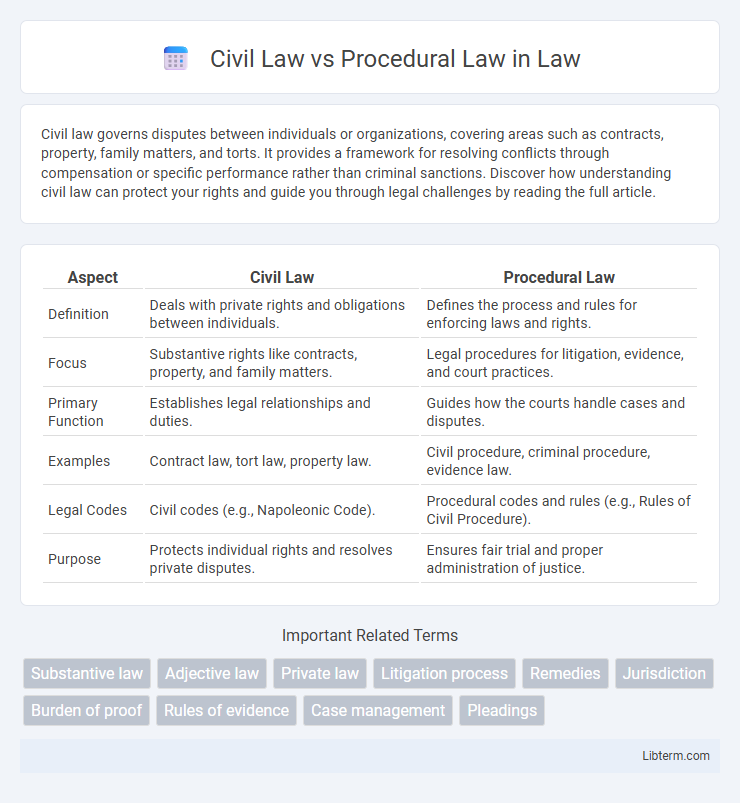Civil law governs disputes between individuals or organizations, covering areas such as contracts, property, family matters, and torts. It provides a framework for resolving conflicts through compensation or specific performance rather than criminal sanctions. Discover how understanding civil law can protect your rights and guide you through legal challenges by reading the full article.
Table of Comparison
| Aspect | Civil Law | Procedural Law |
|---|---|---|
| Definition | Deals with private rights and obligations between individuals. | Defines the process and rules for enforcing laws and rights. |
| Focus | Substantive rights like contracts, property, and family matters. | Legal procedures for litigation, evidence, and court practices. |
| Primary Function | Establishes legal relationships and duties. | Guides how the courts handle cases and disputes. |
| Examples | Contract law, tort law, property law. | Civil procedure, criminal procedure, evidence law. |
| Legal Codes | Civil codes (e.g., Napoleonic Code). | Procedural codes and rules (e.g., Rules of Civil Procedure). |
| Purpose | Protects individual rights and resolves private disputes. | Ensures fair trial and proper administration of justice. |
Definition of Civil Law
Civil law defines the body of rules and statutes governing private rights and obligations between individuals or organizations, emphasizing dispute resolution without criminal penalties. It covers areas such as contracts, property, family law, and torts, aiming to seek compensation or specific performance for harm or breach. Procedural law, in contrast, outlines the methods and processes courts follow to enforce these substantive civil rights effectively.
Definition of Procedural Law
Procedural Law comprises the set of rules that govern the process through which courts hear and determine civil, criminal, or administrative cases, ensuring fair and consistent application of justice. It establishes the methods for enforcing rights and obligations defined by Civil Law, including filing lawsuits, conducting trials, and appealing decisions. Unlike Civil Law, which defines substantive rights and duties, Procedural Law focuses on the legal framework and processes that facilitate the enforcement of those rights.
Core Principles of Civil Law
Civil law centers on resolving private disputes through established legal codes emphasizing rights, obligations, and remedies between individuals or entities. Its core principles include fairness, equity, and the protection of individual rights, ensuring that justice is administered based on predefined statutes and legal precedents. Procedural law, by contrast, governs the methods and processes for enforcing substantive civil rights, outlining how courts operate and how lawsuits progress through the judicial system.
Core Principles of Procedural Law
Procedural law establishes the framework and rules governing the process by which civil law disputes are adjudicated, ensuring fairness, transparency, and due process. Core principles include the right to be heard (audi alteram partem), the requirement for proper notice of proceedings, and the impartiality of the tribunal. These procedural safeguards facilitate the enforcement of substantive rights while maintaining orderly resolution within the judicial system.
Key Differences Between Civil and Procedural Law
Civil law governs the rights and obligations of individuals in private disputes, including contracts, property, and family law, while procedural law establishes the rules and processes courts follow to adjudicate those disputes. Key differences include civil law defining substantive rights and duties, whereas procedural law dictates how cases are filed, evidence is presented, and judgments are enforced. Understanding these distinctions is crucial for navigating litigation, as civil law determines the claim's basis and procedural law ensures fair and consistent legal proceedings.
Purpose and Scope of Civil Law
Civil law governs private rights and obligations between individuals, addressing disputes related to contracts, property, family relations, and torts. Its primary purpose is to provide remedies such as damages or specific performance to enforce rights and resolve conflicts legally. The scope of civil law includes regulations on personal relationships, inheritance, and obligations arising from agreements, distinguishing it from procedural law, which dictates the processes for enforcing those rights in courts.
Purpose and Scope of Procedural Law
Procedural law governs the methods and processes used to enforce substantive rights established by civil law, ensuring fair and orderly conduct of legal proceedings. It defines the steps for filing lawsuits, serving notices, and presenting evidence, providing a framework for dispute resolution in civil cases. The scope of procedural law includes rules of jurisdiction, pleadings, pre-trial motions, trial procedures, and judgments, facilitating the effective administration of justice.
Role of Courts in Civil vs Procedural Law
Civil law governs the substantive rights and duties between individuals, with courts primarily responsible for resolving disputes by applying these legal principles to specific cases. Procedural law outlines the rules and processes that courts must follow during litigation, ensuring fair and consistent administration of justice. Courts enforce procedural law to manage case flow, evidence submission, and trial conduct, while their role in civil law centers on interpreting and applying substantive legal standards.
Examples and Applications in Legal Systems
Civil law governs private disputes between individuals or organizations, such as contracts, property, and family law cases, with examples including tort claims or divorce proceedings. Procedural law dictates the processes and methods courts use to enforce civil law, covering rules on filing lawsuits, evidence handling, and trial procedures seen in jurisdictional requirements or appeals processes. Legal systems like the United States combine both, where civil law defines rights while procedural law ensures fair trial standards and due process.
Importance of Understanding Both Legal Concepts
Understanding both civil law and procedural law is crucial for effectively navigating legal systems, as civil law governs rights and obligations between individuals while procedural law dictates the methods and processes for enforcing those rights. Mastery of civil law principles ensures accurate interpretation of contracts, torts, and property rights, whereas knowledge of procedural law enables proper case filing, evidence presentation, and adherence to court protocols. Comprehensive awareness of these legal concepts enhances strategic decision-making and safeguards justice within civil litigation.
Civil Law Infographic

 libterm.com
libterm.com